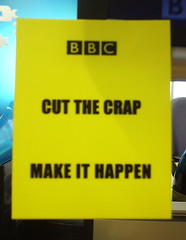
Her piece focuses around the dreaded “BBC Editorial Policy Unit” which was set up to appese the fallout from the 2008 Russel Brand prank call debacle and the prior findings of the Hutton Inquiry. “Russell Brand-gate” was about Russell Brand being, well, Russell Brand albeit on a pre-recorded radio show where someone editorially should have known better, and the Hutton Inquiry was about the fact that the BBC ‘falsely’ claimed the UK government had lied about claims Saddam Hussain had Weapons of Mass Distruction in Iraq.
(Except, that it turned out that the BBC was right all along, but that only came to light years after the Labour-government initiated inquiry had performed it’s ‘duty’ and given The Corporation a good kick in the bollocks)
The Editorial Policy Unit (essentially an internal editorial watchdog), it is claimed, is stifling bold, innovative and risk taking content from being produced because the BBC is too afraid to broadcast anything that might create another Hutton Inquiry or Brand-gate.
And as a former BBC employee I would definitely agree we’ve ended up with a BBC that is afraid to take risks.
The reasons for this, however, go far deeper than just the Editorial Policy Unit – but into areas such as not having the budget for innovative programming because the Tory government has frozen the BBC’s income over the next 4 years (essentially a 17% reduction marked against inflation). Or the corporation being kneecapped from doing anything innovative or risk taking online because the findings of the Graff Report warned that the BBC might be stifling the commercial sector. Now whenever the corporation wants to do something new and innovative online it must perform a series of bureaucratic “Public Value Tests’ and market impact evaluations – in concert with the regulator OFCOM which takes years to compete.
So yes after the (editorial) kicking, (innovation) knee-caping and (resource) strangling the BBC has gone through over the past 5-10 years, yeah it pretty much is affraid to take another risk.
But isn’t that by design and as intended?
Graff Report, Hutton Inquiry, et al are all thanks to the desires of past and previous elected governments and the influence of the media industry as a whole but in particular Rupert Murdoch and The Guardian backed Association of Online Publishers (AOP). This is what everyone wanted, no?
It seems ironic that the publisher of the original piece by Maggie Brown is the main protagonist within the AOP that demanded the Graft Report in the first place.
And we, the British public, have let it happen – perhaps not realising just how lucky we were to have a public service broadcaster like the BBC that would take risks the like of which commercial sector would never consider doing. The promise that the commercial sector, now un-stifled from the BBC’s supposed market saturation, would step in and save the day has sadly not proven true.
So maybe there is a place for strong, risk-taking public service broadcasting after all. Maybe there is a something perverse about people whinging that they don’t want pay £145.50 a year for high-quality, advert free BBC content but then happily shell out £100’s every month to satellite and cable providers who’ve demonstrated about as much risk and innovation as a ham sandwich.
Because otherwise the severely handicapped BBC we have today is the BBC we all let happen. The gift we never really thought we’d miss until it began to disappear. Which it now slowly is.
“Cut the Crap” photo CC Jem Stone, a former colleague. The former Director General of the BBC, Greg Dyke actually commissioned these ‘yellow cards’ during my service at the BBC for rank-and-file staff to use in meetings if unnecessary impediments were getting in the way of innovative and important work being broadcast. Oh how times have changed.
Memories of an era when the BBC was innovative and risk taking: